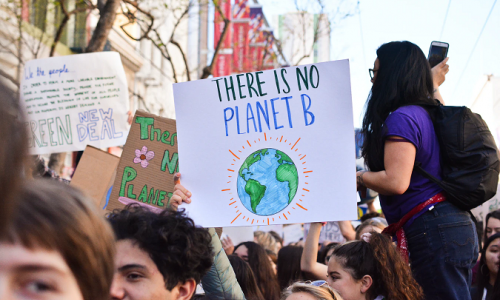Coming to Terms with Climate Grief
Grief and anxiety associated with negative impacts on the environment, known as climate or ecological grief is recognised as a factor affecting mental health.
Sharon Boyd
We are all familiar with the concept of grief, and many of us have experienced the loss of a loved one. Grief and anxiety associated with negative impacts on the environment, known as climate or ecological grief (https://www.climateandmind.org/what-is-climate-grief) is recognised as a factor affecting mental health. As we learn more about the impact on our environment, we may experience a range of emotions, e.g. inner conflict, anxiety, guilt, loss, defence, resistance.
It is important to acknowledge the emotional impact of climate change and species loss. The field of ecopsychology is a collaboration between psychologists and ecologists to investigate methods to assist with processing these emotions associated with environmental issues. Dr Joanna Macy (https://www.joannamacy.net/main), an ecophilosopher and activist, has been at the forefront of this field. She warns that researching information on a topic is not enough, and can cause more problems unless we deal with the associated emotions.
In “Befriending our despair” (duration 4:30) Dr Macy talks about the importance of acknowledging and speaking about the pain we feel in order to be able to move on and take action. (https://vimeo.com/74502395)
Recognising that we are grieving is the first step, William Worden (https://www.climateandmind.org/what-is-climate-grief) outlined four tasks of grief, which are:
• Task 1: to accept the reality of the situation, both intellectually and emotionally
• Task 2: to experience the pain, Dr Macy’s “befriending the despair”
• Task 3: to adjust, including learning new skills and taking on new roles
• Task 4: to reinvest emotional energy
Worden describes this as a spiral process; we can move from one task to another and back again. That is the way it should be, the way grief works. It is not a quick fix, especially as we are facing new information about global crises on a daily basis. This spiral is echoed in The Work that Reconnects (https://workthatreconnects.org/spiral/), a supported grieving process Dr Macy developed with colleagues. That spiral ends with the call to “go forth” to undertake the actions we are best suited for. That can be the most difficult, wondering how to take action when the future seems hopeless.
In collaboration with her colleague Dr Chris Johnstone (https://www.activehope.info/chris-johnstone.html), Dr Macy highlights the importance of hope. This is achieved not by romanticising the past or predicting catastrophe, but by learning to negotiate a complex and uncertain present. Drs Macy and Johnstone outline the concept of “active hope”, which is rooted in this acceptance of reality, acknowledgement of pain, and drive to take on new roles in this uncertain future. This requires active attention and practice, which can make it easier to maintain (https://www.activehope.info/active-hope.html).
Above all, what is important to remember is that we are in this together, we are not alone. We need to speak our pain, support each other, and work together to learn how we can best apply our skills to the actions that are needed.
References
Macy, J. (1995). Working through environmental despair. In Ecopsychology: restoring the earth, healing the mind. T. Roszak, M. E. Gomes and A. D. Kanner (Eds.). (San Francisco, Sierra Club): pp. 240-262
Macy, J. and Johnstone, C. (2012). Active hope: how to face the mess we’re in without going crazy. (California, New World Library)
We're in this together, we're not alone
Our online community is a supportive space where you can connect with like minded individuals, ask questions, share ideas and support one another to achieve the change the world needs.



